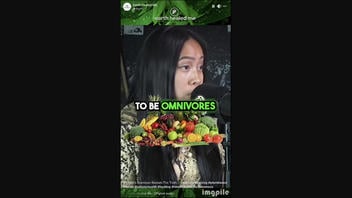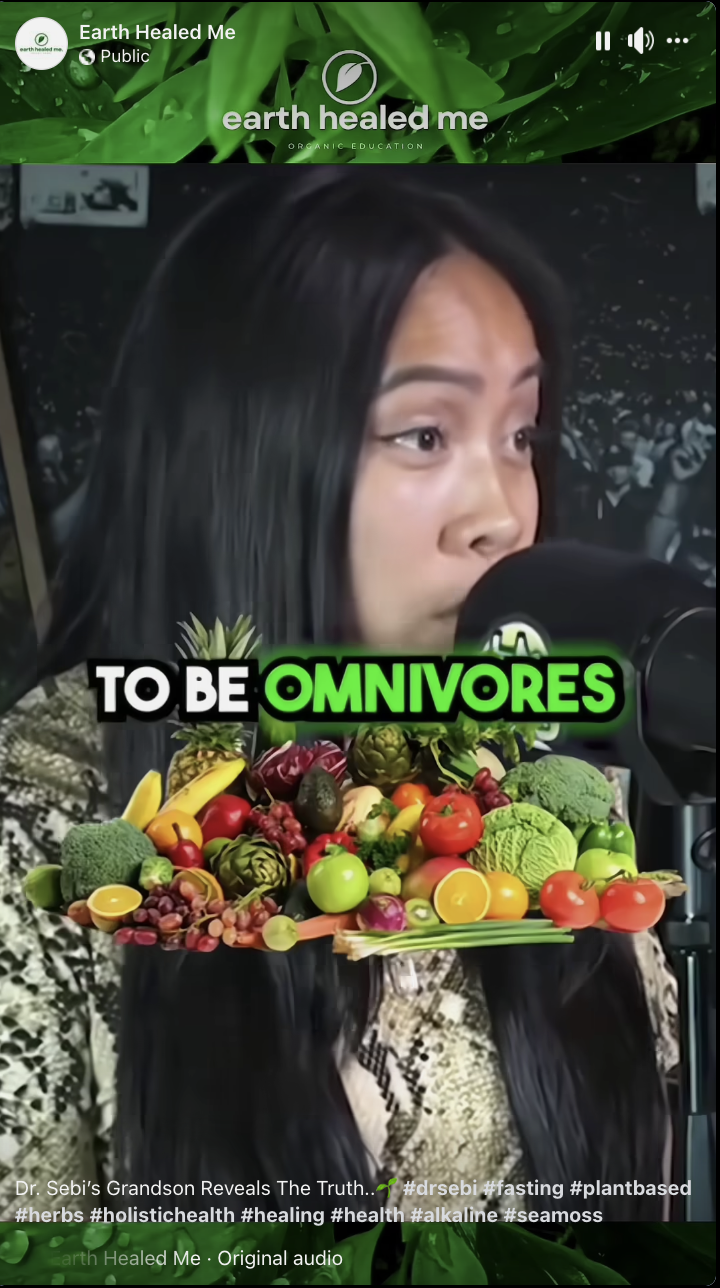
Is the human body "designed" for a plant-based diet and incapable of ingesting and breaking down meat? No, that's not true: Two nutrition experts confirmed that to Lead Stories. The claim in a social media post is largely based on the incorrect definition of the word "omnivore," which is a term used to refer to the species that can eat different foods -- not just plants, as the video on social media claims.
The story appeared in a reel (archived here) published on Facebook in September 2023 under the title:
Dr. Sebi's Grandson Reveals The Truth...
The video contained the following exchange:
WOMAN: Our whole system is built to be omnivores, which is plant-based eating, which is strange, like I said, because we're here trying to ingest meat and break this down in our stomachs, but we can't because we don't have the proper bodily functions to do that.
MAN: We're not animals period.
This is what it looked like on Facebook at the time of writing:
(Source: Facebook screenshot taken on Mon Sep 18 17:25:02 2023 UTC)
Christopher Gardner, a professor of medicine at Stanford University, specializing in evidence-based research of different diets, told Lead Stories via email on September 18, 2023, that the claim in the video is:
Entirely false.
The clip fails to provide any evidence supporting the claim. The key argument used to justify it was the incorrect definition of the word "omnivores." Contrary to the reel, it does not mean creatures eating exclusively plants -- those are herbivores.
According to Merriam-Webster, "omnivore" is a noun referring to somebody "omnivorous," and this adjective, in turn, means:
feeding on both animal and vegetable substances.
Britannica defines "omnivore" similarly:
animal with wide food preferences, which can eat both plant and animal matter.
A National Geographic explainer elaborates on the types of foods humans are biologically capable of consuming and adds that -- contrary to the claim -- animals can be omnivores, too:
People eat plants, such as vegetables and fruits. We eat animals, cooked as meat or used for products like milk or eggs. We eat fungi such as mushrooms. We also eat algae, in the form of edible seaweeds such as nori, which are used to wrap sushi rolls, and sea lettuce, eaten in salads. Bears are omnivores, too. They eat plants like berries as well as mushroom fungi and animals like salmon or deer.
Meat entered pre-human diets about 2.6 million years ago, and one 2016 study published in Nature argued that it could play an important role in the evolutionary process, transforming pre-humans into modern humans:
H. erectus differs from earlier hominins in having relatively smaller teeth, reduced chewing muscles, weaker maximum bite force capabilities, and a relatively smaller gut. This paradoxical combination of increased energy demands along with decreased masticatory and digestive capacities is hypothesized to have been made possible by adding meat to the diet.
The fact that humans have been eating different foods for a very long time is supported by archeological findings, wrote Peter Ungar, a professor at the University of Arkansas and the author of the book "Evolution's Bite: A Story of Teeth, Diet, and Human Origins," in his 2017 piece for Scientific American:
While humans don't have the teeth or claws of a mammal evolved to kill and eat other animals, that doesn't mean we aren't "supposed" to eat meat, though. Our early Homo ancestors invented weapons and cutting tools in lieu of sharp carnivorelike teeth. There is no explanation other than meat eating for the fossil animal bones riddled with stone tool cut marks at fossil sites.
Ungar points out that humans -- whose guts are still longer than in exclusively meat-eating animals -- had to learn how to adjust to a particular locality and season to survive, and, therefore, their diets have historically greatly varied from place to place:
Food choice is as much about what is available to be eaten as it is about what a species evolved to eat. And just as fruits ripen, leaves flush and flowers bloom predictably at different times of the year, foods available to our ancestors varied over deep time as the world changed around them from warm and wet to cool and dry and back again.
Dana Hunnes, a senior clinical dietician at the Ronald Reagan UCLA Medical Center, disclosed that she is vegan in answering a Lead Stories request for comments on September 18, 2023. However, she disagreed with the content of the reel in question, specifically the line in the video, "We're not animals, period." Hunnes' response to that:
We ARE animals.
She continued:
We can eat a wide variety of foods, whether we should is another question from a moral, ethical, biological, health, and environmental perspectives.
Dr. Sebi mentioned in the title of the video on Facebook was not a real medical doctor -- it was a commercial pseudonym of Alfredo Darrington Bowman who promoted a controversial alkaline diet and sold supplements, promising to cure all diseases with herbs, even though he did not have any formal medical training and was barred from practicing medicine later in life.
Bowman died in 2016 in Honduras, but claims using his name continue to circulate on social media.
Other Lead Stories fact checks about statements mentioning Dr. Sebi can be found here.


















